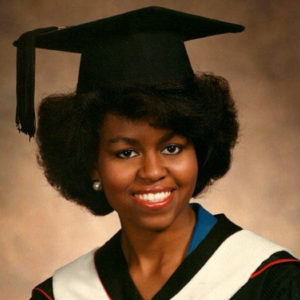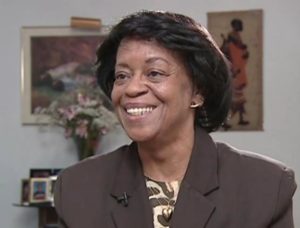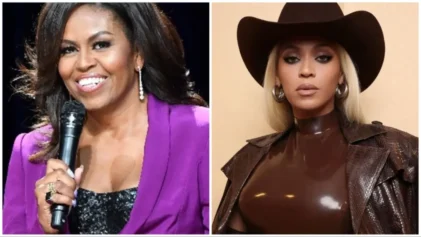Peter Slevin, a veteran national and international reporter with the Washington Post who is now a journalism professor at Northwestern, interviewed a vast collection of Michelle Obama’s friends, family members and acquaintances—in addition to, in his words, reading hundreds of thousands of words she’s spoken—over the last seven years to craft the most comprehensive portrait to date of the nation’s first African-American first lady.
Slevin spoke with Atlanta Blackstar about the view he got of Michelle while working on Michelle Obama: A Life and the process of constructing this intimate view of her life.
Early in the book you described her time at Princeton as part of that twoness that W.E.B. DuBois describes, Black people having to live in two worlds. I wonder if you get a sense of whether she still feels that or is at a height now where those kinds of feelings slip away?
Slevin: I think you can ask whether that ever fully slips away. What is clear is that Michelle Obama is comfortable walking in several worlds at one time. One of her great strengths of her professional career, which lasted 20 years on the south side of Chicago, was an ability to walk between worlds. Her friends and her colleagues say they were amazed actually at how she could shift gears and connect with people in all kinds of different places. And that skill has translated to what she’s doing in The White House. That said, I think it’s also really striking that the audience she pays the most attention to is usually young kids of color. It’s a connection to I think Chicago and her own upbringing that carries through.
Does she have times and places where she can let down her hair, no pun intended, and still be Black?
Slevin: I think we saw it this very week on BET, when she felt completely happy, ebullient, with saying ‘Black Girls Rock! We rock.’ And then going on to say what she meant by that. She feels very comfortable talking about Blackness, talking about what it means to be an African-American girl, especially in this country. So yeah, very much.
It felt like early on there was a great discomfort with many white people, particularly white politicians, hearing that kind of talk. I don’t hear it as much any more. It’s kind of dissipated. Wonder if that’s because she’s been around now and been doing it for so long or because she kind of breached some kind of wall?
Slevin: That’s a great question. I would love to hear what some white politicians have to say about that. It’s clear that Michelle Obama is very comfortable talking about race, talking about inequality, as I say in the book. As first lady she is walking a pretty careful line in a role that really doesn’t have strong definition. But she has found a way to talk about the issues she cares about, talk to the audiences she wants to focus on, and carry a strong message that I think is going to be her legacy.
I was taken aback by the quote from Abner Mikva, about Michelle being uncomfortable with politics because Michelle had a Black life in Black Chicago. It seems that the same could be said about the discomfort of any Black person in America. I wonder if you’ve gotten a sense of any anger at how this system that in some ways they’re in charge of still seems to be so incredibly skewed against African Americans?
Slevin: Michelle is in this very public role, where she is careful about what she says. And so I am very careful about putting words in her mouth, which I don’t want to do. But if you look at the speech she gave on the anniversary of the Brown v. Board of Education, you will find some of the ways she points out we still live in a mostly unequal society. This is before Michael Brown in Ferguson. She pointed out that too often police will stop a Black man for just walking down the street. I think it’s worth looking back and remembering what Michelle had to say on the campaign trail in 2007. If you look at her speech in Orangeburg, South Carolina. She went to South Carolina State for a very particular reason, remembering where protesters had been killed. In that speech she talked about a world that is still not fair; you can see what she was thinking then. Similarly on the campaign trail she would talk about how the world has gotten a little meaner in her lifetime, and it’s not fair because they set a bar—she always says “they”—and just as you’re about to reach that bar they move the bar. I think one can understand, can see in Michelle’s comments, how she’s very mindful that the deck is just a little bit stacked.
When we see her doing some of the things she does, dancing with Jimmy Fallon, trading jokes with Kimmel and Letterman, it’s hard to imagine this is the occupant of the same position as Laura and Barbara Bush.
Slevin: Yeah, Michelle Obama is not Bess Truman or Dolly Madison. It’s clear when you see her at the Easter Egg Roll. I think that video now has 10 million views of her dancing.
Do you think she has changed that role forever, that we’re in a new era—or is this really just a product of her unique gifts and personality?
Slevin: I think it’s just what you said. It’s a product of her unique gifts and personality, and how she has tried to play the role and use the platform. Michelle’s friends say she is the most strategic person they’ve ever met. And there’s plenty of evidence that Michelle asked herself how she could make a difference in this role and what it would take to do that. And making a difference is really her goal. She said, ‘I don’t want to be in this job and not change anything. I don’t want to see eight years evaporate.’ So there’s a purpose to what she’s doing.
It comes across clearly throughout the book that she’s not really fond of politics, but people keep asking, Will she run, what is she going to do? It feels like she still feels there are better uses for one’s time. Do you have any intel on that?
Slevin: I yield to Barack Obama who said he has heard these stories about Michelle Obama going into politics and she would have to be abducted by aliens first. Just picture Michelle Obama in a room trying to work something out with Mitch McConnell and John Boehner. That is not I think where she wants to be. But I should add that she happens to be really good at it, though. She raises a huge amount of money; she brings audiences to their feet on the campaign trail. She knows what she thinks and she very often says what she thinks.
And she’s willing to compromise?
Slevin: Well, that’s another question. On that one I yield to her brother, who says, ‘You don’t want to get into an argument with my sister when she is dead set on something.’ I don’t know about that one.
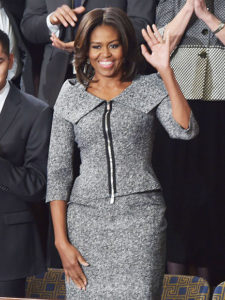
Slevin: That’s a good question, and it probably takes a bit of a nuanced answer. The vast majority of sources in my book, and they’re all named, were people I identified and met with and thankfully trusted me with their story. But it’s also true that many people checked in with the East Wing first to see if it was okay to talk to this guy. It’s fair to say that the East Wing, particularly in the last couple of years, has not wanted to cooperate with authors. Not just me, but authors in general. And so there are people I would have loved to have talked to who were discouraged from talking to me.
I would imagine she’s probably safeguarding her own story.
Slevin: She’s doing her own writing. And I would not be surprised if she’s been advised to keep some of her stories to herself. But more to the point, as with many really smart people, Michelle Obama wants to tell her own story. Unfiltered. And who can blame her? She is doing some writing that will come out after they leave the White House. I have not heard of her having a contract, but she will get a contract in about a minute and a half. Whenever she is ready, cause she’s got a lot to say. One of the things I feel good about this book is that her voice carries throughout the book. The book starts out with her talking to Anacostia High students and ends with her talking to students at Booker T. Washington in Atlanta, and she gets the final word at Maya Angelou’s funeral. Luckily she has given a large number of interviews and I’ve read hundreds of thousands of words that she’s spoken. She did speak to me a couple of times, but it was a good long while ago. I have not had the pleasure of an interview since the ‘08 campaign. But I did want this as much as possible to be a book that was faithful to her voice. And so I drew from things she said all of her life.
There’s already been a reaction to her mother’s comments about being worried in the beginning that Barack was biracial. While it didn’t sound any different than many Black mothers of that era would say, there seems so little room for authenticity or honesty in American politics now.
Slevin: That’s a great example of the point. Marian Robinson was born in 1937. She’s got strong, progressive, solid as you can be ideas about everything. And she was expressing a concern imagining what life might be like for the children who are not all of one race.
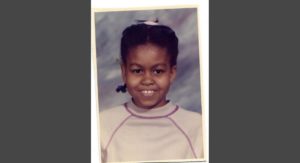
Slevin: I’d love to ask that question of them, but I don’t know the answer. They’ve obviously made millions of dollars from Barack’s two books. And I think it’s clear that Michelle likes nice things. But they both made very principled decisions early in their professional lives to first of all do work that had meaning. I think we can see it in the second term especially that values they agreed on that attracted them to each other in the 1990s are very much what they’re talking about now, about fairness, about fundamental inequality of opportunity in this country. And they took jobs and pursued professions where they could do just a little bit as I wrote in the book of fighting against the stacked deck.
We don’t hear her defend him as much these days. I wonder if that’s a function of the campaign being over or maybe she’s just grown tired of that.
Slevin: I think it is that the campaign is over. She served as his, in a way, validator, I think. Validating his story, bringing him down to earth, in both of the campaigns. In particular in the second campaign saying he might be unpopular in some parts of the country and might be having a hard time with the Republicans, but don’t give up on this man. And more recently I suspect she feels she doesn’t have to defend him, he’s doing just fine.
The tensions in their marriage came through in the book very loud and clear. Something many husbands and fathers can identify with is, as he calls them, the “clipped phone conversations.” But I’m wondering, it seems like for a marriage that has the common struggles, getting to spend eight years in the White House does wonders. He’s close by, they’ve got plenty of help.
Slevin: She talks about how living in the White House is like living above the store. And they both talked about how great it is he’s home for dinner pretty much every night at 6:30. It’s upstairs. They have dinner, they hang out with Malia and Sasha, then he goes back to work after that. On one hand the pressures must just be startling to any mortal person. But they do have a lot of family time. They talk about how much family time they have. Though lately Michelle says ‘Malia and Sasha are teenagers, so they don’t want to spend any time with us. They have their own friends.’ There does seem to be a normality that they’ve created in this completely bizarre world they inhabit.
Wonder if there’s now as much for grandma to do, with the girls spending their time with friends?
Slevin: I get the sense that she’s a very strong presence in the lives of the girls, and the life of Michelle. Michelle has talked about how much her mother’s presence in the White House means to her. You might have seen it in the book. She said I can go upstairs to the third floor, and I can cry and I can complain, and my mother will listen to me and then she’ll tell me, Go on back and do what you’re supposed to do. She’s very close to her mom and was extremely close to her father. She talked about him during the first campaign. She said my father’s voice is the voice I hear when I’m trying to figure out whether I’m making a good decision.

